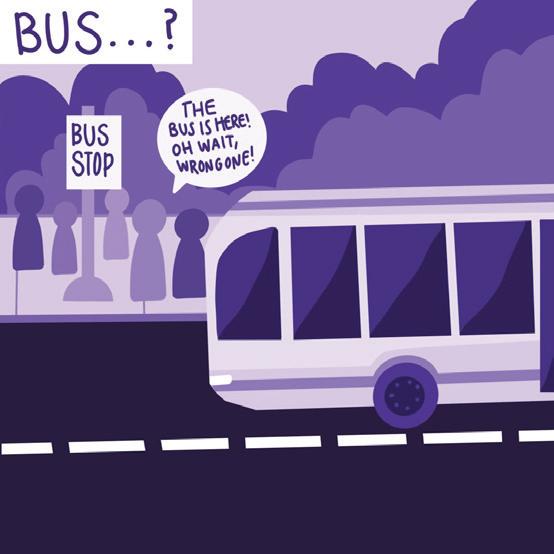YOUR GUIDE TO STUDENT RENTAL NEIGHBOURHOODS





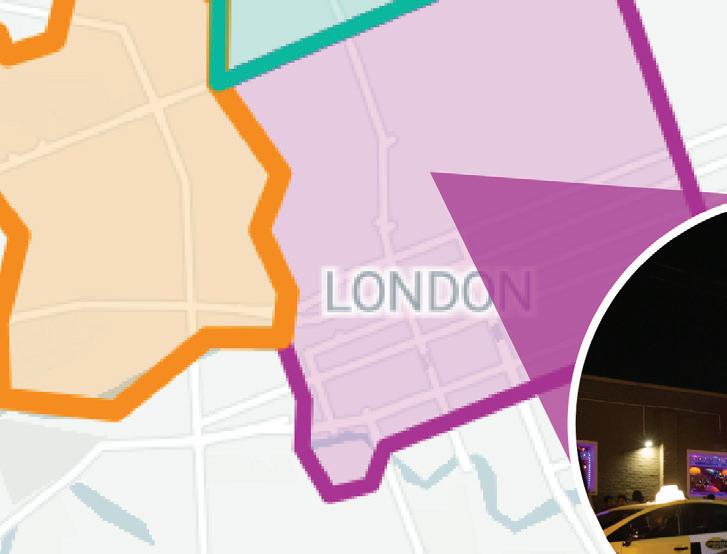



















 LAUREN MEDEIROS CULTURE EDITOR
LAUREN MEDEIROS CULTURE EDITOR


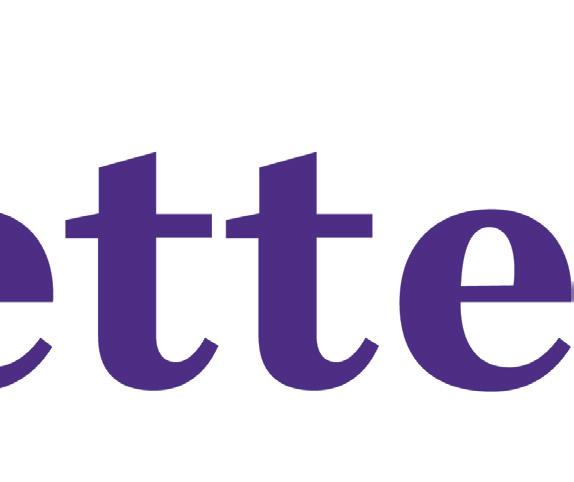
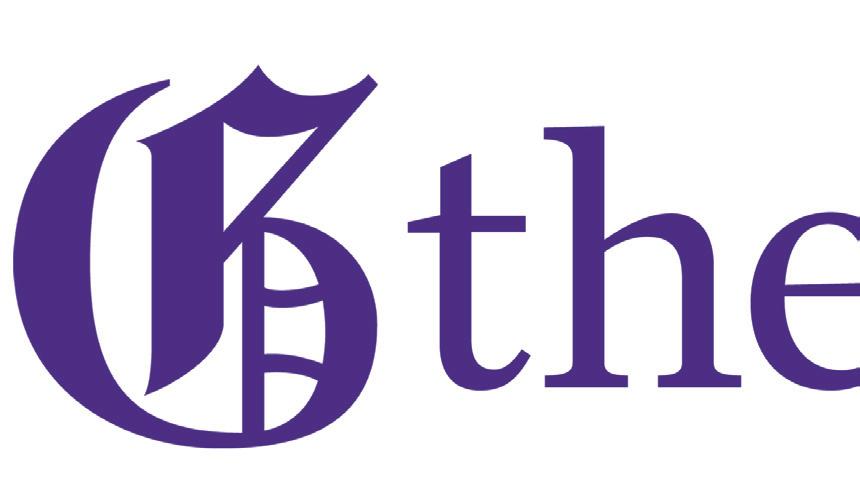
By the end of the day on Nov. 18, 2018, at age 50, environmental scientist Paul van der Werf had defended his three-year PhD thesis in food waste prevention and simultaneously began his career as an electronic dance music producer.
An academic, composting expert, former business owner and electronic DJ, Paul is as multi-talented
and eclectic as they come.
Paul, an adjunct assistant professor in Western University’s department of geography and adjunct professor at Ivey Business School, spent the year following his PhD teaching himself how to produce, mix and master electronic beats in a studio he built in the spare room of his London home.
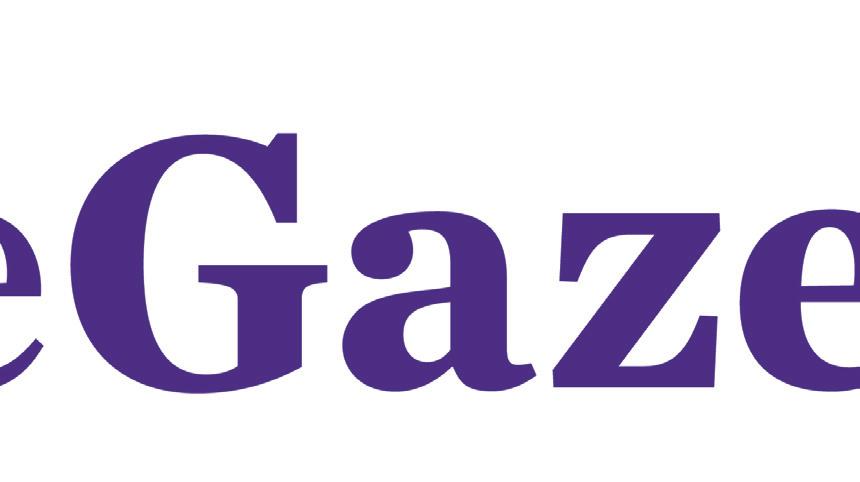
Fast forward a few years and songs later, the 58-year-old professor, known in the music industry
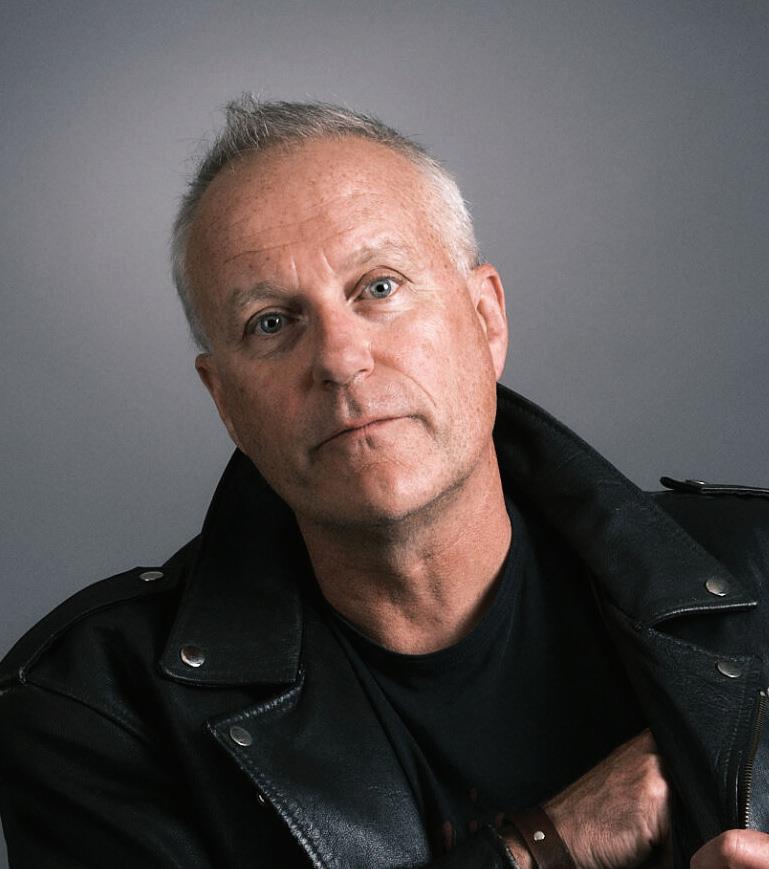
as apaull, has an executive producer in New York City, a record distributor in Hamburg and a promoter in Berlin.







Although Paul does not teach courses at the university, he helps supervise graduate students, manage labs and develop projects with other professors as his music career blossoms. CONTINUED ON P5

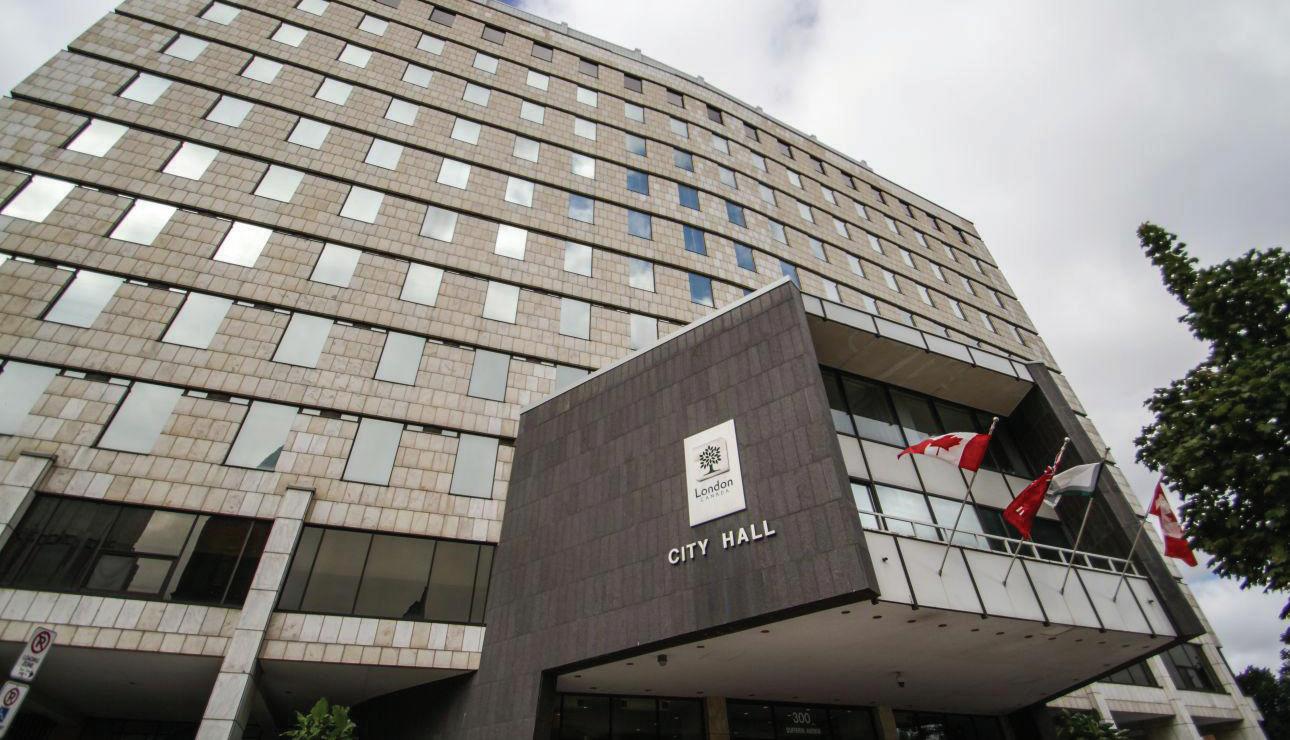 JESSICA KIM NEWS INTERN
JESSICA KIM NEWS INTERN


New legislation from Premier Doug Ford’s government, Bill 23, is seeing scrutiny and opposition from Londoners — including city council planners and some faculty at Western University’s Ivey Business School.
Bill 23, the More Homes Built Faster Act, proposes amendments to environmental conservation policies and significantly changes processes for land development in Ontario. The province introduced the bill to meet its goal of building an additional 1.5 million homes across the province over the next 10 years.
The bill has faced widespread opposition from environmentalists, who have critiqued the lifting of environmental protections, and raised concerns in municipal governments, some of which stand to lose significant revenue under the new regulations.
London’s municipal budget would be left with a funding gap of $97 million over a five-year period, according to a sta report presented during a special meeting of the city council’s Strategic Priorities and Policy Committee Nov 22. Most of the loss would come from Bill 23’s changes to municipalities’ collection of development charges.
This loss would “place pressure on the municipality to find other sources of funding to maintain the infrastructure investments which are required to provide additional new housing,” according to Deputy City Manager, Finance Supports and City Treasurer Anna Lisa Barbon.
The committee ultimately voted unanimously to call on the provincial government to defer action on Bill 23 until a further review can be conducted. Other municipalities in Ontario have passed similar resolutions, including York, Guelph and Durham.
London environmentalists have also expressed concerns, including a group of Ivey faculty members specializing in sustainability, who wrote an oped for the Toronto Star earlier this month arguing the bill is “short-sighted and will undermine longterm prosperity.”
If enacted, Bill 23 would alter how the province’s environmentally-sensitive areas, such as floodplains, wetlands and natural heritage sites are protected. The bill also cuts parkland dedication requirements in half, which planning experts have speculated will result in a loss of bodies of water and green spaces.
Ivey professors Diane-Laure Arjaliès, Tima Bansal and Jury Gualandris argued in their op-

ed that Bill 23 has “incalculable ecological, social, and financial costs” and the substantial e ects on the environment, housing and economy should be addressed before its passage. The professors emphasized in the article the harm in restricting conservation authorities and developing areas that will “increase flood risk for residents, reduce biodiversity, and contribute to climate change.”
“Globally, we have no idea what could be the trickle down e ects of destroying the region,” explained Arjaliès, an associate professor at Ivey and founder of Ivey’s Sustainable Finance Lab, in an interview.
“We are fighting for you, we are fighting for the next generation.”
Bansal, Gualandris and Arjaliès joined 10 other Ivey faculty in delivering a submission to the Legislative Assembly’s Standing Committee on Heritage, Infrastructure and Cultural Policy on Nov. 17, outlining their specific concerns at the intersection of their research and Bill 23. All co-signatories are part of Ivey’s Centre for Building Sustainable Value.
“We believe it is our job as faculty members working for a public university … to show what research shows and to help our members of parliament make decisions based on evidence,” said Arjaliès.
On Nov. 4, following the introduction of Bill 23, the provincial government announced a separate
plan to remove 15 smaller portions of Ontario’s Greenbelt, totalling 7,400 acres, and add another 9,400 acres from elsewhere to the protected area.
Municipal A airs and Housing Minister Steve Clark said the aim is to build 50,000 houses on the removed acres.
This proposal reverses course on multiple years of promises to never develop or move Greenbelt land from the Ford government. Notably, Ford proposed development in the Greenbelt ahead of the 2018 election, but quickly reversed this after significant public backlash and outcry.
Bill 23 was initially announced at a Toronto Region Board of Trade event on Oct. 25, with Ford calling it the “third-installment” of the government’s housing action plan.
“These policies … [are] going to cut through red tape, unnecessary costs, other bottlenecks that are standing in the way of housing supply for too long in our province,” Clark said at the event.
The bill passed its first reading in the legislature the same day, and after lengthy debate in its second reading on Nov. 22, it was ordered for a third reading.
The status of the bill can be followed on the Legislative Assembly of Ontario’s website.
The University Students’ Council voted Nov. 9 to add a 15-minute public question and comment period to the end of council meetings.
Beginning with the Nov. 30 council meeting, USC executives and councillors will address questions and comments from Western University students. This period will only be held once a month, in the second part of the council’s monthly meeting.



The motion, proposed by Ivey Business School councillor Chris Mohan, aimed to “allow for increased engagement of students in the business of the council.”
The motion narrowly passed, with 43 per cent of councillors voting in favour, 31 per cent opposed and 26 per cent in abstention.
Arts and Humanities Student Council president, Sydney Turner, proposed three amendments to the motion, one of which — limiting the question period to 15 minutes — passed.
Turner’s other two motion amendments failed — one would have excluded media from asking ques-
tions during this period “as journalists” and the other would have limited comments to those pertaining to issues addressed in the council meeting.
Mohan and Huron University College Students' Council president Matson Kitamisi raised concerns about Turner’s two failed amendments.
“As a council, we are accountable to every student, and that includes the media as well,” said Kitamisi, speaking about the failed amendment to limit members of the media from commenting. “We need to improve our transparency, and make sure that we are able and accountable to respond to any questions that arise.”
Turner said the amendment’s purpose was not to “limit transparency,” but to prevent the question and comment period from turning into a “quasi-interview period.”

In response to Turner’s third amendment — limiting comments to those pertaining to issues addressed in the council meeting — Mohan clarified when he proposed the motion to add the question and comment period, he “did not have in mind a particular scope to [the] questions.”
Turner argued that, by limiting questions to top-
ics relevant to the meeting, council “[isn’t] limiting students from discussing these issues,” and pointed to students’ councillors and faculty councils as places where they could go to raise concerns “outside of the scope of what [council is] discussing right now.”
Other councillors questioned how the relevance of a question would be determined.
Mohan said, in a statement to the Gazette, he hopes the question period will give students “an opportunity to directly engage with the work that Council is doing.”
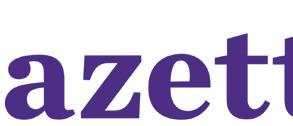
“It means students can ask questions to members of Council at our meetings, particularly if there are questions or comments they wish to bring forward as individuals.”
The USC meets twice a month on the first and final Wednesday of the month at 7 p.m. for two readings of each meeting — there will be no meeting in December. Agendas are posted on the USC’s website at least two days in advance of each meeting.
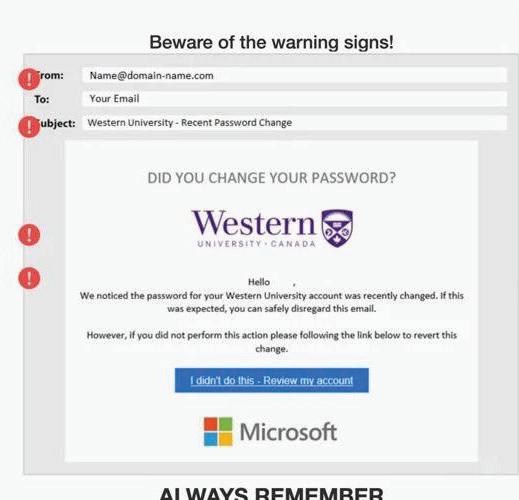 SOPHIA SCHIEFLER NEWS INTERN
SOPHIA SCHIEFLER NEWS INTERN
Western Technology Services has been testing Western students’ ability to detect spam by sending them a series of false phishing emails.
The emails sent to students informed the recipient the password for their Western University account had been “recently changed.” The email then instructed students, if they had not performed this action, to press a link at the bottom of the page to revert the change and review their account.
Students who clicked the link were then directed to a message from WTS informing the recipient they were conducting an exercise in phishing awareness to educate Western’s students and sta on phishing emails.

WTS’ chief digital o cer Mark Daley explained their mission is to “make sure that our community members are aware of the threats that exist, understand how to identify them and know how to react to those threats.”
“If a threat actor is able to get access to Western systems, because credentials have been compromised, that comprises all of our security,” Daley added.
Raymond Leduc, a department of management and organizational studies lecturer and career advisor, said he feels strongly about the phishing scams students receive. He has noticed that, within the last year, phishing scams have been getting “more sophisticated and more impressive in terms of how legitimate it looks.”
Leduc frequently receives emails from concerned students, asking him whether emails they are receiving are legitimate or a scam. Many of the
Fake phishing email sent by Western, Nov. 7, 2022.
scams emails received by students appear to come from real Western email addresses, or use logos to appear authentic.
On the WTS website, there is a list of recent scam emails sent to students as well as examples of what scam emails look like. Recent attempts include a “warning” users were about to delete their O ce 365 emails and impersonations of the Canada Revenue Agency.
Western students have been asked to complete a Cyber Security Awareness Training module by March 1, 2023. The exercise, created in collaboration between Western and Terranova Security, aims to educate students on cyber security.
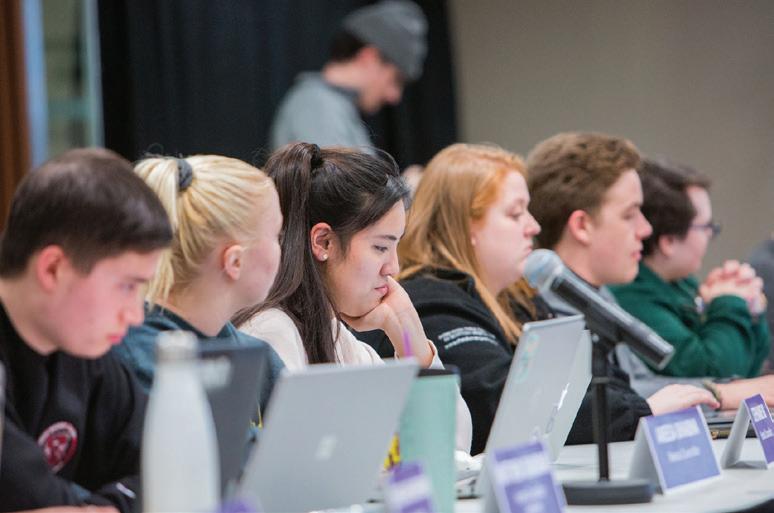
“WTS is extremely committed to continuing to grow our communication and our interaction with our students,” said Daley.
The Spoke will be replacing the defunct USCEats app with xDine, a new online ordering system, to address the cafe’s long wait times.
According to Keemia Abbaszadeh, the vice-president communications of the University Students’ Council, the USCEats mobile app was facing food order problems, and xDine “was chosen as an improved replacement.”
The USC has already implemented xDine for the Wave — the council’s dine-in restaurant on the second floor of the University Community Centre — and planned to launch the same system for the Spoke after reading week, but experienced technical issues.
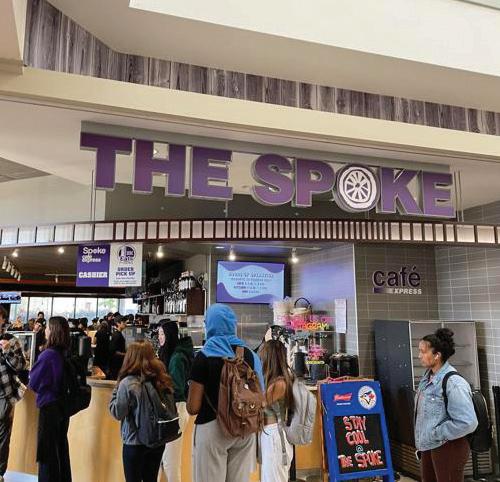
Abbaszadeh said the USC has been training sta to be “prepared for the increased order volume when the [system] is launched.”
Through xDine, orders can be made online for pick-up using a QR code at the Spoke’s Cafe Express counter and at the Wave’s bar area. Students can look through the menu in their web browser, and choose a pick-up time for their order — as soon as possible or scheduled.
“It’s possible to conveniently order from class and pick-up when students are ready, without any lines,” said Abbaszadeh.
The UCC has been swamped this semester with students standing in line for on-campus eateries including the Spoke, Starbucks and Tim Hortons.
Olivia Grosso, a fourth-year creative writing and English literature student, said she stood in line at the Tim Horton’s in the UCC for 30 minutes before becoming impatient. Grosso said she had come to “quickly get a co ee.”
“It definitely takes time out of my day … it definitely takes time out of studying,” she said.
Sta ng shortages have forced several Western University-run campus eateries and food services to close or shorten hours of operation this semester. On-campus eateries closed due to sta shortages include the UCC’s Pita Pit, the Social Science Centre’s Tim Horton’s and the Western Student Recreation Centre’s Booster Juice. The UCC main floor Starbucks was also closed after the franchise found “challenges” with the location’s layout.
Western has already launched its own mobile app, WesternEats, where students can pre-order from some of campus’ lower-tra c eateries.
The University Students’ Council postponed the vote on removing “O Canada” from its meetings until January, saying it wanted councillors to have more time to consult on the “divisive” issue.
“Through conversations, it seems like [removing “O Canada” is] a divisive topic and that many students or councillors have spoken about not understanding all the implications of this,” said USC president Ethan Gardner, who proposed delaying the vote.
“Quite a large portion of councillors” initially planned to abstain from voting at the Nov. 9 meeting due to the topic’s controversy and timing, according to Social Science councillor Peter Kermack.
Kermack added he thought it would reflect poorly on the USC if the motion to remove “O Canada”

was passed so close to Remembrance Day.
“It’s probably the worst possible time to be debating this considering ‘USC councillors vote to remove ‘O Canada’ just two days before the Remembrance Day’ is not the best look,” said Kermack.
Fellow Social Science councillor Felix Benjamin Nomerovsky also supported postponing the vote, saying the Indigenous Students Association at Western University suggested tabling the motion so they could discuss the matter with their members.
The ISA said they have no comment and their meetings on the matter will not be open.
USC vice-president governance and finance Ethan Biswurm initially proposed dropping the national anthem from the standing orders of council \ at the Oct. 28 meeting, along with adding an announcements section.
Kermack amended the motion on Nov. 9, splitting it into two parts — one vote on removing “O Canada” and a separate vote for adding the announcement section.
The USC passed the motion to add a 15-minute announcement portion to the start of each meeting. During the announcement portion, students will be able to ask questions directly to councillors and executives.
isolation the community often deals with.
López, the spouse of a postdoctoral researcher at Western, was afraid to go outside because she struggled with her English.
She first came to Canada with her partner in 2018 and worried about stumbling over her words when talking to community members. It wasn’t until she started attending Western International’s Tea & Info Sessions that she says she was finally comfortable in her own skin.
“I was really afraid to [make] mistakes, but then I learned ‘well, it’s the only way that I can start going outside of my house,’” she says.
Western International hosts Tea & Info Sessions for the partners of international students every Friday afternoon as a way to provide support through networking and linguistic opportunities.
Sandra Pehilj, an international student advisor at Western University and the Tea & Info Session program coordinator, started the event in 2007, when one of the international students she was working with expressed concern about their spouse feeling homesick.
Pehilj wanted to create a space where international students’ spouses could meet each other to enjoy a welcoming environment while learning about Canadian culture.
“I think it's a wonderful program at Western that brings joy and satisfaction to participants who meet people who are experiencing similar challenges,” she says. “They learn about resources, they build networks, they become successful community members — once they find the job, and they still come back and join us.”
Western International plans to run this event throughout the entire academic year in order to garner more attendees. For Pehilj, this ensures there’s an e ective and lasting way to mitigate the
Ramón Tejero Vallenas has been a regular attendee of the event since 2019, when his spouse was completing her PhD at Western. He says that attending the sessions provided him with the social, linguistic and cultural support he needed after moving from Brazil to Canada. .
“I think that, the time you are here, you start to have more social interactions. it is a social support, because when we had a meeting once a week, I was not working, I was only trying to look for jobs,” he explains. “For me, the more experience you have [being introduced to] a new country, in a new language, the more you can learn about the language or the culture.”
Vallenas says he has been able to meet other people in the Brazilian community and speak Portuguese, while still challenging himself to practice his English.
Pehilj emphasizes that personal growth is the main goal of the event. She points out that it also benefits students in the long run, because they know their loved one is able to find a sense of community and start building their own lives, while they focus on their studies.
“If you are able to express yourself, if you're able to communicate and have that small chat, it makes you feel like you're able to contribute,” Pehilj says. “The international students who know that their spouses are connected in this meaningful way, are able to focus on their research and not worry about ‘my spouse is home alone, they don't have community.’”
The Tea & Info Sessions run every Friday at 1:30 p.m. on the second floor of the International and Graduate A airs Building.



It’s the end of first semester, which means it’s time for final exams and papers — but just the start of the dreaded house-hunting season.
Western University has six main student neighbourhoods, each with their own perks and quirks. While your dad may be hunting for cockroaches and assessing the structural integrity of your rental's roof, you’re dealing with the more important things. Is there a good takeout nearby? Will you be able to make that 8:30 a.m. lecture you’re chronically late for? How close are you to the best place to let loose on the weekend (or the weekday, we don’t judge).
Whether you’re a first-year looking for an o -campus steal or a third-year who hates their roommates, the Gazette has you covered.
Want something that’s a little close to everything? The intersection of Oxford Street and Wharncli e Road is for you.


Located one bus, or around a 20-minute walk south of campus, is the student-dominant neighbourhood of Oxford and Wharncli e.
No need to UberEats anything here. There’s chain restaurants like McDonald’s, Papa John’s and Starbucks, but also local staples like BTRMLK and Potato Noodles — and downtown is only a 15-minute walk away.
The infamous Cowboy’s Ranch is also in this area, providing a perfect weekend getaway for those who love country music.
Grocery stores are not particularly close, so unless you have a car, get ready for a not-so-fun trek on the bus.
One other downside is that break-ins are relatively common. In this neighbourhood, always make sure to lock your doors and windows, don’t leave important possessions in your car overnight and keep valuables out of window sightlines. As John Mulaney says, use your street smarts.
Don’t let that scare you though — theft can hap-pen in every neighbourhood. Oxford and Wharncli e is equally close to both campus and downtown, a happy middle ground with some of London’s better rent prices to match. If you come from a city, you shouldn’t have a problem adjusting and making it your home.
— Sarah Wallace, Managing Editor
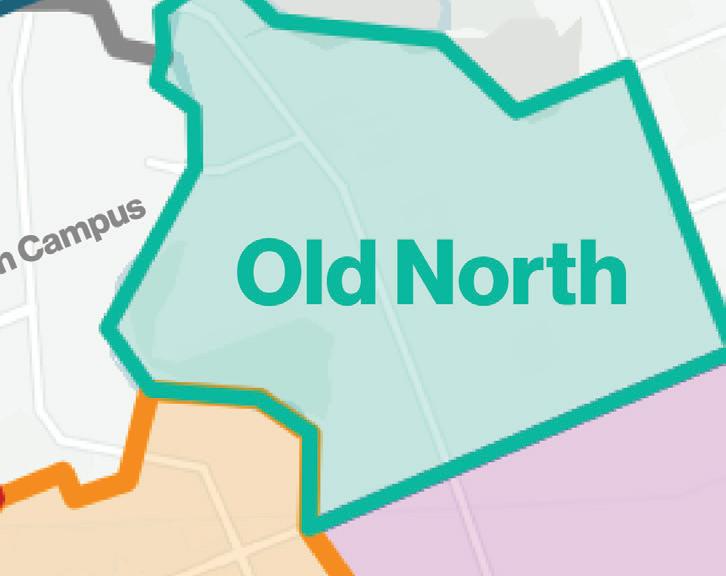
Old North is arguably the most sought-after place to live for Western University students — and for a good reason.
The neighbourhood is located right outside of Western's Main Gates, surrounding King’s University College. Students in these areas rarely take the bus to campus, because the walk to class ranges from 10 to 20 minutes.
Not only is Old North close to campus, it’s also conveniently near downtown. After a brief walk to Richmond Street and a five minute bus ride, you’ll be in the centre of Richmond Row.

That being said, grocery stores are not the most readily available, with the closest one a 20-minute walk away. Old North also isn’t the greatest for food options around — except King Richies, of course.
Depending on your opinions on Homecoming and St. Patrick's Day, Old North is either the best place to live or the worst. A few days a year, the streets get packed with large crowds and are filled with commotion. While it’s great to have a bed nearby for a mid-day recharge, the mess left on your front lawn might not be.
Close to campus, close to downtown and close to parties — what’s not to love?
— Danielle Paul, Culture EditorA 30-minute walk north of campus is the heart of London’s Masonville neighbourhood.
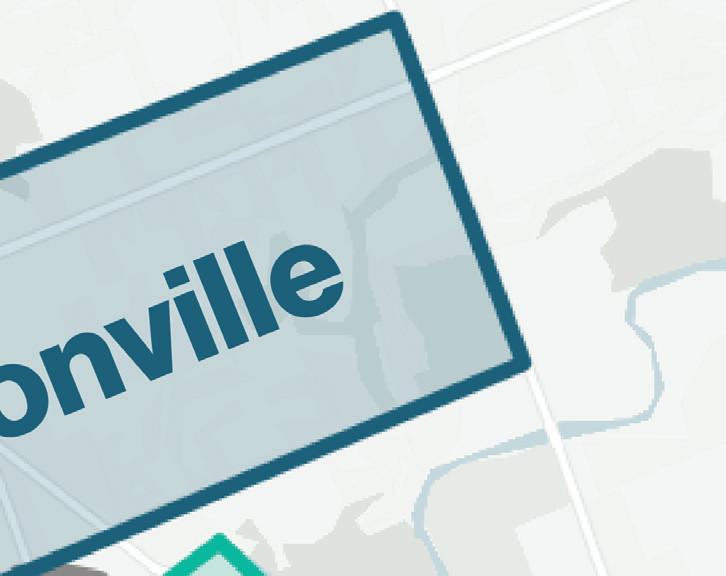
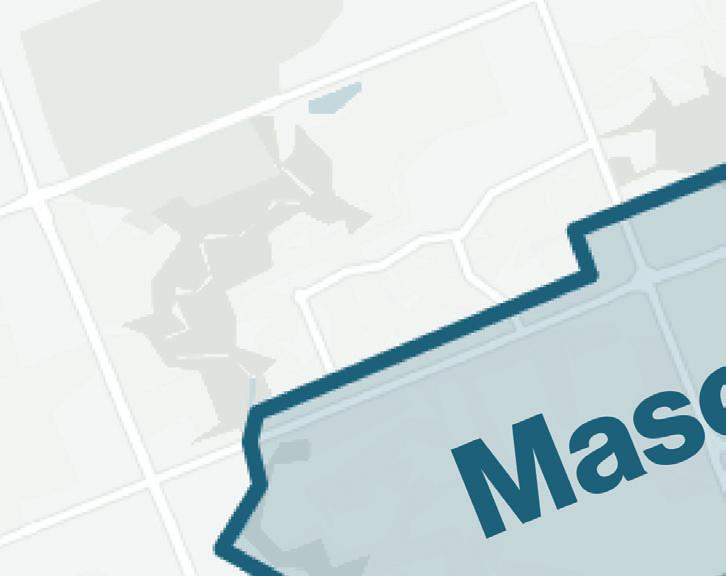
If you don’t have a car, the nearby CF Masonville Place is a one-stop shop for all your needs.
There are lots of food options if you’re hungry, staples like Tim Hortons, Harvey’s and Swiss Chalet adorn the area. But when they get old, you’ll have plenty of unique, local eateries to try, from cafes like Boxcar Donuts and Happiness to Thaifoon and Richie's Family Restaurant. Grocery stores like Loblaws and Farm Boy are also within walking distance.
You won’t find the same party scene as Old North or downtown because most students in the area live in apartments or close to residential neighbourhoods. The area is also far from student-frequented bars, though, Masonville’s wide array of shops boasts an LCBO and The Beer Store.
The area is known for being safe, surrounded




by family-inhabited residential areas, with the big apartment complexes o ering key card access and overnight security.
Masonville’s selling point is convenience. If you want quick, easy access to lots of food and shopping, this is the place for you. Just be mindful that it’s not exactly walking distance from London’s student nightlife.
— Miles Bolton, Sports EditorIf you manage to snag one of the remain on-campus rentals, it has one major advantage — you’re right on campus.
No early morning bus ride, no scramble to find parking and no worrying at bus stops. Your classrooms are only steps away.
Due to being on campus, the area is considered safe, but there aren’t many housing choices. From the Red Bricks on the corners of Sarnia Road and Western Road, to the apartment complex behind Saugeen-Maitland Hall or the townhouses at Platt’s Lane, the choices are limited and go fast.
The close proximity to campus also means higher rent. The same sized unit at Red Bricks next to Ontario Hall has a higher rent than the Red Bricks at Oxford and Wharncli e.
Although living close to campus is convenient for class, it is a long trek to Richmond Row and grocery stores, and the transportation costs add up. You’re close enough to Old North, but if you’re looking to be social o campus, be prepared for a long commute and hefty price tag.
— Andy Yang, News Editor
If you’re a foodie, living close to Wonderland Road and Oxford Street is one of the best choices you can make in your undergrad.
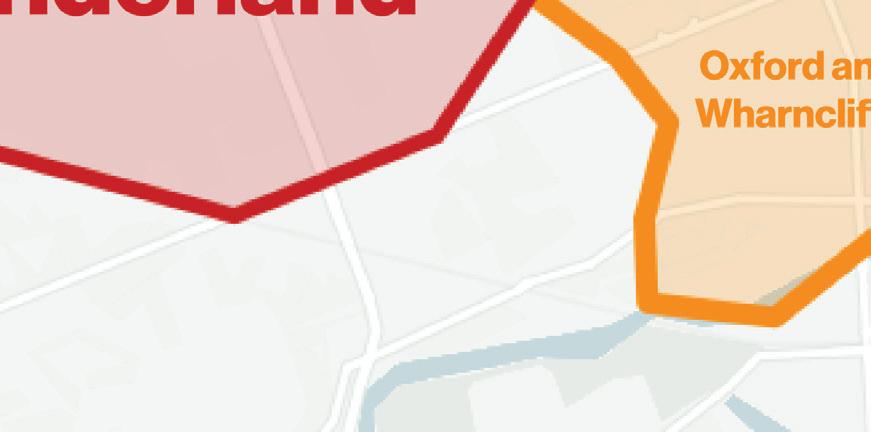
Hometown food heals homesickness. In this neighbourhood, you can find everything from authentic Chinese, Italian, Mediterranean and Japanese restaurants to your favourite fast food joint. There are even three bubble tea shops to choose from within a 15-minute walk.
For those who love home-cooking, not having a car will never be a problem in this area. The largest Asian supermarket, Food Island, is a 15-minute
walk, as are Sobeys and Farm Boy.
The area is a bit far from campus — you need to set aside 25 minutes to walk — and 30 minutes away from downtown.
The neighbourhood is also quiet, with a mix of students and families, making it perfect for those spending their nights cramming for the next exam. For those wanting house parties, good luck finding one.
If you are looking for a place to live in this area, do it early. There’s a mix of apartments and houses in di erent price ranges, but they go fast.

— Estella Ren, News Editor
Downtown might showcase the best and the worst of London student life — it’s a long slog to campus, but a 30-second walk to Richmond Row.
Taking the bus to Western’s campus is annoying. They come frequently, but most drop you o at Delaware Hall. If you have class at the Social Science Building, Ivey Business School or Huron University College, your 20-minute bus ride has a 10-minute walk tacked onto the end of it. It means waking up earlier, getting home later and lots of hoping the bus comes soon.
But living downtown puts the best of London at your fingertips. It’s not just the proximity to bars and clubs, but the cafes and restaurants are there too. From classic nightlife hubs like the Ceeps to hangover brunch favourites like the Campus Hi-Fi diner, Richmond Row will have you set.
If you have a car, living downtown is definitely worth it. Without one, ask yourself: is taking the long bus everyday worth it?
If it is, downtown is the place for you.
“The music is another one of those bucket list things that I want to accomplish,” says Paul. “I love learning, I love school. The music piece is just another one of those things that’s been on my list. I consider it a big e ort — similar to the e ort of doing a PhD.”
Paul travels now frequently to the Netherlands, his birthplace, for both his academic work and music career. The EDM scene is far more popular in Europe, and he hopes to take European inspiration to further his work in North America.
He considers his music to span the three electronic music genres — ambient, techno and house. His music can be considered techno with its fast pace and beats per minute, but also has the melodic quality of ambient and the inclusion of vocals typically associated with house.
“I don’t necessarily create the pounding music you hear when you go to a club,” Paul says. “I’m certainly within that vein but I’ve really put my own stamp on it.”
Paul also takes inspiration from the artists he discovered in the 1990s, when he was doing his undergraduate and master’s degrees at the University of Guelph. Classic rock bands and old school hip hop, which he used to gravitate towards, are both incorporated into his current “sound.”
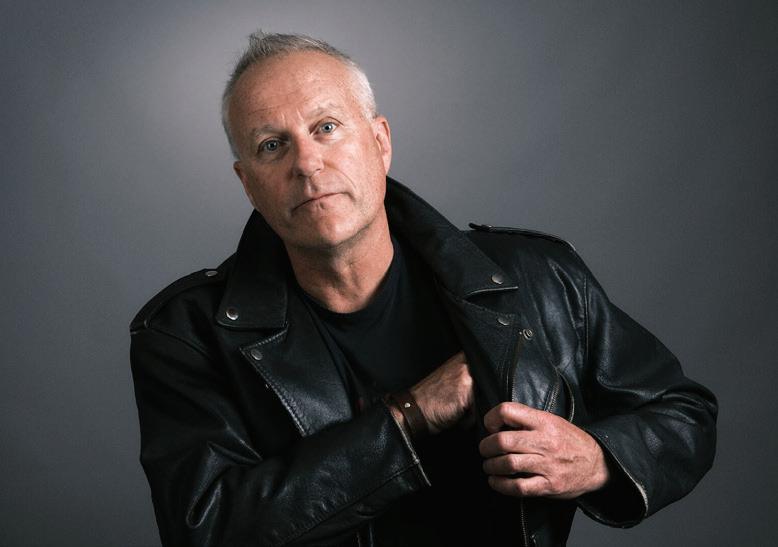
“I wanted to produce [music] thirty years ago but put it aside… now I’ve unlocked that desire by taking myself back in time to tap into those influences,” Paul says.
The professor has worked for 30 years as an environmental scientist focusing on waste manage
Students will no longer be required to upload proof of vaccination at Western, but the school’s mask mandate in instructional spaces will remain in place.
Western University announced it was revoking the mandate on it was revoking the mandate on Nov. 29, meaning students, employees and visitors will no longer be required to upload proof of vaccination with three doses of an approved COVID-19 vaccine for the winter semester. This comes after the university announced on Sept. 6 that proof would need to be provided by Jan. 9, 2023. Masks will still be required in classroom settings.
The school did not respond to the Gazette’s request for comment in time for publication.
Western was one of the only post-secondary institutions in the province to mandate a third shot of an approved COVID-19 vaccine, and, until recently, was one of the only schools to require indoor masking.
The University of Toronto requires students living in residence receive a booster dose of a COVID-19 vaccine, and Seneca College required three doses to attend. Seneca also announced that they will be ending their vaccination policy on Dec. 31.
A number of schools have continued or reinstated mask mandates, with the University of Waterloo announcing Nov. 8 that masks would be required in instructional spaces.
The university is still encouraging the community to get vaccinated, and Western’s vaccination clinic remains open.
ment research. For 25 of those years, he owned an environmental consulting company. He sold the company in May 2019 as his role grew at Western and his music career became more of a focus.
Jim Graham, a Huron University College alumni, met Paul in the late 90s when Paul was running a composting facility in London. Graham has been involved in the environmental industry since 1997, and is currently the president and chief executive o cer of the London-based business, TRY Recycling, which Paul assists and consults with. The pair became friends early on and have maintained their relationship throughout Paul’s various career moves.
“He had long hair, he seemed like your sort of hippy, composting guy at the time,” says Graham. “My first impression was [that] he was brilliant, he was really a scientist when it came to composting, he was very passionate.”
Four years ago, when Paul came to Graham and told him about his decision to pursue electronic music, Graham knew he was serious. Throughout their two decades of friendship, Graham has learnt that when Paul does something, he fully commits to it. Graham is fascinated by his friend’s intense passion, and has enjoyed hearing the evolution of his music’s style and sound –– from his first self-produced projects, all the way to his most recent globally-influenced songs.
“I always enjoy seeing Paul’s brilliance from a technical, science, regulatory perspective on one end of his psyche, and then the creative and the musical and the artistic side — I love watching it all come together through electronic music,” Graham says.
Kate Schieman, an HBA recruiter at Ivey, worked in the department of geography’s Heal Lab as a masters of science student while Paul was doing his PhD. Schieman initially thought that he was a professor, but soon found out he was a student like herself, enrolled in the same courses as her peers.
Although they were on completely separate projects, they immediately connected in the lab, and ended up having a drink at the Grad Club soon after meeting. Paul became a mentor to her during their shared time at the university and their friendship has only grown stronger since they both graduated.
Schieman clearly remembers the day when Paul told her he was going to start taking an online DJ course in the summer of 2018. At the time, Paul was a client of her’s at Hi-Ignition Fit Lab, a spin studio in downtown London where she teaches. During lab sessions, Schieman recalls Paul’s endless supply of EDM song recommendations for her to play in
My journey to Locomotive Espresso was nowhere near as relaxing as the cafe’s warm woods atmosphere.
I was lost in an unfamiliar area downtown on a cold day when I decided to try out Locomotive. Located in a quaint residential neighbourhood on Pall Mall Street and operating out of a converted house, Locomotive o ered a warm and cozy feel.
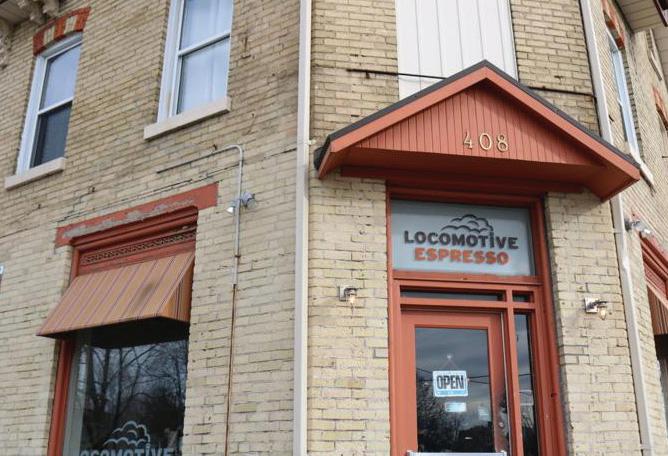
On arrival, I opt for a ca eine alternative and end up with a matcha oat latte — a drink that will give me some energy without the jitters. The barista recommends I pair it with the cafe’s banana loaf, one of the gluten-free baked goods provided by a local vendor, Helm Baked.

The banana loaf is $3.50, more than my donut at Commonwealth, but I am perfectly fine with the price, considering it’s locally-sourced and has a beautiful crispy sugar crust. The matcha latte is surprisingly creamy, made with the steamed milk alternative and a touch of honey.
I sit at one of the nine tables in the cafe. Although there is a stable wifi connection, two of the nine spots are labelled “laptop free,” serving as turnover tables for those who prefer a quick visit. The chalkboard menu and hardwood floors add to its classic cafe feel.
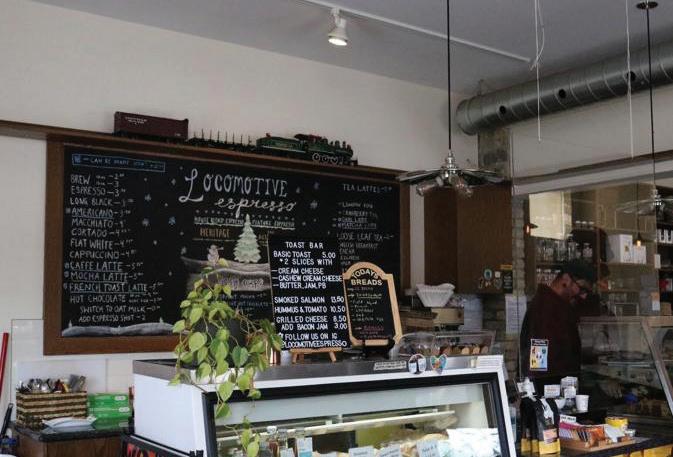
Bonnie Doiron, the barista lead at Locomotive, has been at the cafe since it first opened in 2014. She explains that London didn’t have a huge co ee scene at the time like other Ontario cities. Couple Charles and Jill Wright started Locomotive to fill this gap.
A central part of the cafe is their traditional espresso machine. Baristas are trained to do quality checks of the espresso throughout the day to ensure it stays well-balanced.
“Co ee is my passion,” Doiron says. “I had worked in chain stores before Locomotive, but now being able to be more creative and explore manual machines — it reminds me of the romance
of co ee, it’s really uplifting.”
The couple sold the business this past October to the cafe’s longtime manager William Law and his wife, Kata Law.
The founders’ daughter Alexis Wright still frequents the cafe. She used to work part-time for her parents when it first opened when she was in the eighth grade, even if it was just for a few hours on the weekends.
“When my parents envisioned this shop, it wasn't everyone in their own bubbles, doing work,” says Alexis. “It was more about talking, meeting new people and having a common place to join together.”
Doiron continues to encourage this community-based vision in her work at the shop.

“We try to make sure everybody is welcomed,” says Doiron. “There’s no gatekeeping — we just want to introduce people to good co ee.”
At this point, my matcha is done and I feel like it would be a disservice to not try the espresso Doiron raves about. I down the single espresso shot before I head back out into the cold, pleased with its warmth and chocolatey aftertaste.
Locomotive Espresso has paved the way for other London co ee shops with its intimate, neighbourhood feel. Although this cafe wasn’t in the plans, I’m glad my long morning journey ended up here.
class.
Paul continues to attend the classes and now spins to his own music, which Schieman happily plays.
“People really love it,” she says. “They love it even more when he’s in-class — they’re like ‘I can’t believe this.’”
The recruiter and spin instructor says she has always admired Paul’s dedication — to his PhD, his company and now his music.
“I'm not surprised at all that he's been able to move [his music] this quickly and blow up…there’s no age limit to learning,” Schieman says. “Paul is a true testament that we can wear many hats and all be lifelong learners if we put our minds to it.”
Paul’s next project, an EP titled “Sans Phobia,” is set to release Dec. 9 — his third release of 2022. The collection takes a heavier tone, alluding to the cold and dark winter ahead. The professor and artist’s musical endeavours often deals with serious topics, such as censorship and the isolation of COVID-19, but still tries to keep all of them upbeat and something people can dance to.
The professor welcomes the creativity that music production allows him, and intentionally keeps the scientific parts of his life separate. For Paul, music is an outlet that allows him to think in a completely di erent way than he has been trained to.
“I’ve had a long interest in creativity and I find for the reason that it uses a di erent part of my brain,” he says. “It gives the mathematical and writing part a little bit of a break, and I find it very fulfilling.”
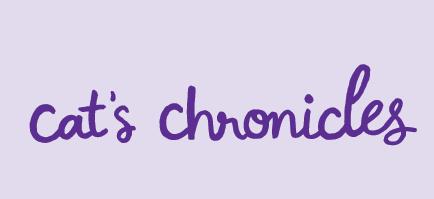
 CAT TANG CULTURE EDITOR
CAT TANG CULTURE EDITOR
As the year draws to a close and the weather gets colder, there seems to be a certain magic in the air, and I don’t mean the holidays — I’m talking about cu ng season.
Cu ng season refers to the trend of getting into seasonal romantic relationships during the colder months of the year, usually starting in mid-fall and running through the winter.


Maybe the phenomenon stems from the desire to have someone to bring home for the holidays or kiss under the mistletoe — either way, a free human space heater does make more financial sense than racking up your utilities bill when it gets chilly outside.

While I love a good Christmas rom-com as much as anyone, and it is exciting to watch my friends get into relationships, the romantic expectation surrounding this time of the year touches on a personal insecurity of mine: I’m 21 years old and have never been in a serious romantic relationship.
I’m going into this cu ng season single again. I’m someone who really values alone time, so I don’t necessarily feel more lonely this time of year, but sometimes I do look at my friends’ relationships and think: why not me? In the words of Taylor Swift herself, it’s hard not to feel that “I’m the problem, it’s me.”
All throughout high school and university, I’ve always been the “single friend” — a third
wheel on the tricycle of my friends’ romances. I’ve never felt uncomfortable riding shotgun on my friends' relationships, and, more importantly, I’m not an awkward third wheel: I’m a cool third wheel. I don’t ask to join in on dates or follow couples around — I get invited because I’m simply a joy to be around.
I’ve done face masks with my friends and their boyfriends, tried on gifts to see if they would fit right, organized promposals and been a mediator during disagreements. I see myself as a fun add-on, like the extra tunnel expansion pack you buy for your hamster’s new cage.
I think a lot of my anxiety around being single comes from a fear of missing out rather than a genuine desire to be in a relationship. Also, I already have a weighted blanket and therapist — so I’m not really sure I need a boyfriend.
Although I worry about being a third wheel for the rest of my life, I wonder, do I even want to be in a relationship? I’m not sure. As Taylor Swift once said, “We’re happy, free, confused and lonely at the same time.”










28 minutes played per game.
MILES BOLTON SPORTS EDITORThe Mustangs football season may be over, but there’s a new sports sheri in town.
When Western University’s men’s and women’s basketball teams opened the home portion of their schedule, they did so in front of an electric — although rather small — crowd at Alumni Hall.
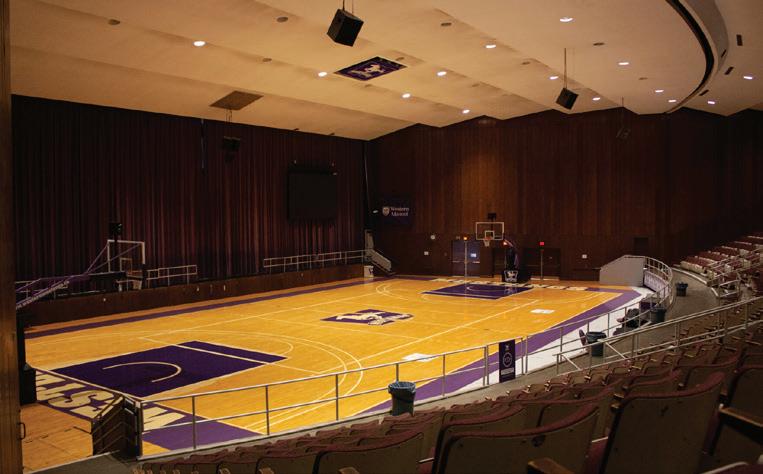
The Mustangs are not the Toronto Raptors, but they’re the best basketball showcase in town. And Western students are missing out on the most underrated show on campus.
Basketball is classified as a “G1” sport in Ontario University Athletics — the same level as football and hockey — and the talent pool in the league reflects that. Those who watch the Mustangs play live get a glimpse of two of Canada’s most talented collegiate players.
Fifth-year forward Aryan Sharma has quietly made a name for himself in the OUA. He is leading the men’s team — and the conference — in scoring, averaging 22 points per game. Following the team’s home opener, head coach Brad Campbell said the team heavily relies on him while he “does what Aryan does.” Few players have the same poise as Sharma, and he’s thrilling to watch live.
Sharma claims to have had multiple o ers from other big schools in Canada coming out of high school, but the Milton native opted to stay local.
Watching the women’s team, you’ll notice one player making an impact all over the court: fourthyear guard Ariane Saumure. Saumure leads the women’s team in scoring, averaging 17.8 points and
The men’s and women’s teams often play backto-back, and are fun to attend live. The Mustangs put on an impressive pre-game show and game presentation with lights, music, in-arena announcements and a concession stand serving pizza, popcorn and soft drinks.
Sure, the Mustangs don’t get the same hype as professional basketball or March Madness, but if you like sports, the games are worth checking out. The National Basketball League of Canada’s London Lightning play their home games at Budweiser Gardens, but why trek downtown in the middle of winter when there’s an arguably better showcase of talent right on campus?
Living in the football team’s shadow caps the attention Western’s basketball teams get, but it’s good basketball, and as a fan it’s nice to not be sitting on cold, metal bleachers in southern Ontario’s winter weather.
Alumni Hall may have only been one quarter filled for the home opener, but the crowd was buzzing. Just imagine the scene of a full arena during a Mustangs playo game.
If you’re still on the fence, give Mustangs basketball a try, you may be surprised at how fun it is to watch.

and sexual violence is when a major upset is reported by the media, like Western in September 2021 or #MeToo. It starts a roar on social media, with people saying “never again.” But after a few weeks, it goes out like a flicker, and people move on.
SARAH WALLACE MANAGING EDITOR


Content warning: The following article discusses instances of gender-based and sexual violence.




On Sept. 24, 2021, I wrote about the worst time in my life: my survivor story.
I was sexually assaulted just six weeks before the reports of gender-based violence began emerging from Western University’s Medway-Sydenham Hall at the end of Orientation Week. I wrote my personal essay a few weeks later from a place of pure emotion and pain.

My assault, like most, did not make the news. It was quiet. It was in my student home. It was someone who I had known since I was a kid and trusted previously.
Now, I write this essay in a time of reflection. I can separate myself from the events of last fall. This does not mean I am completely recovered — I don’t think I ever will be.
Often, the only times we talk about gender-based
But I didn’t move on. I couldn’t. I stayed right where I was as the world moved on around me.
It’s still hard to read about the reports from last September. What’s harder is to hear people say that it’s better for the community if we don’t talk about it anymore, or that it’s better for survivors like myself to be protected from being triggered by this public discourse. I hate hearing that it’s better for everyone — survivors included — to “move on” and keep the bureaucratic improvements behind closed doors.
Shielding people away from these stories, for the sake of survivors or otherwise, is not the way to address GBSV. The only way we can properly combat GBSV is through open communication and discourse — where survivors who feel comfortable sharing their stories can, and in an open forum where we can make concrete change.
GBSV a ects all Canadians. According to Stats Canada, 44 per cent of all women in 2018 experienced some form of GBSV by an intimate partner in their lifetime. Almost two-thirds of all Canadians know a woman who has experienced abuse. Sexual assault is also the only violent crime in Canada which is not declining.














Our brains will block out trauma that is too overwhelming in an attempt to protect itself. We don’t want to remember things that are too painful — parts of my assault are blocked out. Often, we forget about major traumatic events because we don’t want to remember the pain that it inflicted on so many people.


I fear that’s what might happen with September 2021 — that we forget and stop talking about it entirely because it dominated our discourse for the year, and people don’t want to hear more about a painful event. Trauma is not a trend for people to hop on and hop o whenever they want.
Everytime I see a story involving sexual violence — whether it be Ronan Farrow’s Catch and Kill or Kyle Beach and the Chicago Blackhawks — I flash back to my time of powerlessness. I take longer to process these stories, because I see glimpses of myself in them.
I know these stories aren’t easily digestible, and there are some survivors who never want to be reminded of their past — which is completely valid. But I need to see these stories. I need to know that I am not alone, and that I am not a statistic. I want to acknowledge and see these people’s stories because they matter and make my experience less isolating.
There’s a definitive before and after of my life since my assault. Sometimes I get sad that pivotal people in my life, like my boyfriend, didn’t know who I was before my assault. Sometimes I miss the person who I was.
Dec. 6 marks the 33rd anniversary of the École Polytechnique massacre — where a man shot and killed 14 women because they were in the school’s Engineering program and he was not accepted.
My mom came to Western September 1990 — less than a year after the massacre. Just like me, my mom’s university experience was clouded by gender-based violence.
I don’t want my daughter to have her university experience clouded by GBSV like my mother and I did. The cycle needs to stop now.
In order to eradicate GBSV, we must talk about it and keep talking about it, even when it’s hard or we don’t want to. I am now reclaiming my agency, and I am not going quietly.
If you need support, Anova’s crisis line is available 24/7 at 519-642-3000.
The Huskies mounted an impressive drive in response, taking the ball all the way down within Laval’s 10-yard line. But it was all for not as Rouge et Or thirdyear free safety Felix Petit intercepted the ball in the endzone.
Although it seemed like the end for the Huskies, the team got a much needed defensive stop on Laval’s next drive. After getting the ball back, seventh-year quarterback Mason Nyhus brought his team right back to the Laval goal line — and it was do or die for the Huskies.
Nyhus completed a three-yard pass to second-year receiver Daniel Wiebe to keep the game within a field goal.
On Laval’s responding drive, Desjardins completed a 55-yard pass to fourthyear receiver Antoine Dansearu-Leclerc to completely switch field position. The drive resulted in a Rouge et Or field goal to put them up by six points with under two minutes of play.
It proved to be enough.
“I said we were going to win the [Dunsmore Cup], win the [Mitchell Bowl] and win the Vanier Cup, and that's what we did,” said Mital. “I just want to go home and celebrate with everyone from Quebec.”
The Rouge et Or defeated the Huskies 30–24 in the 57th Vanier Cup, winning their first national championship since 2018 and 11th in program history.
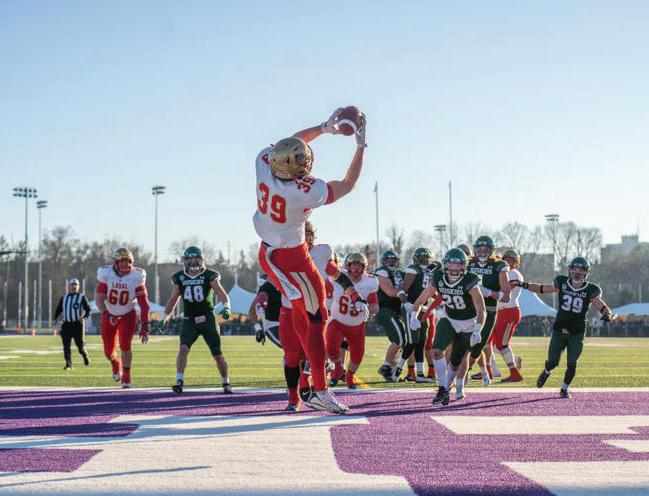
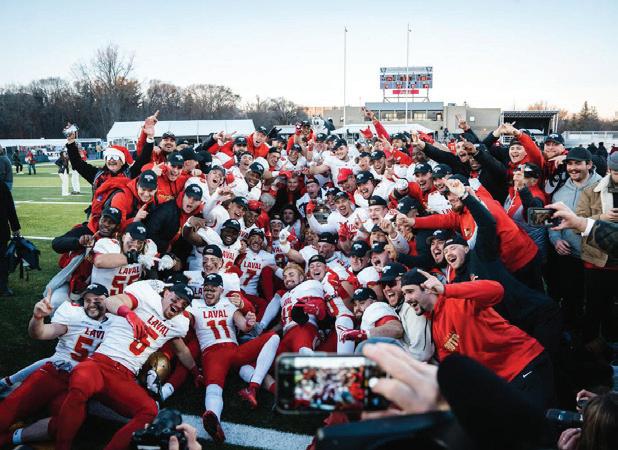
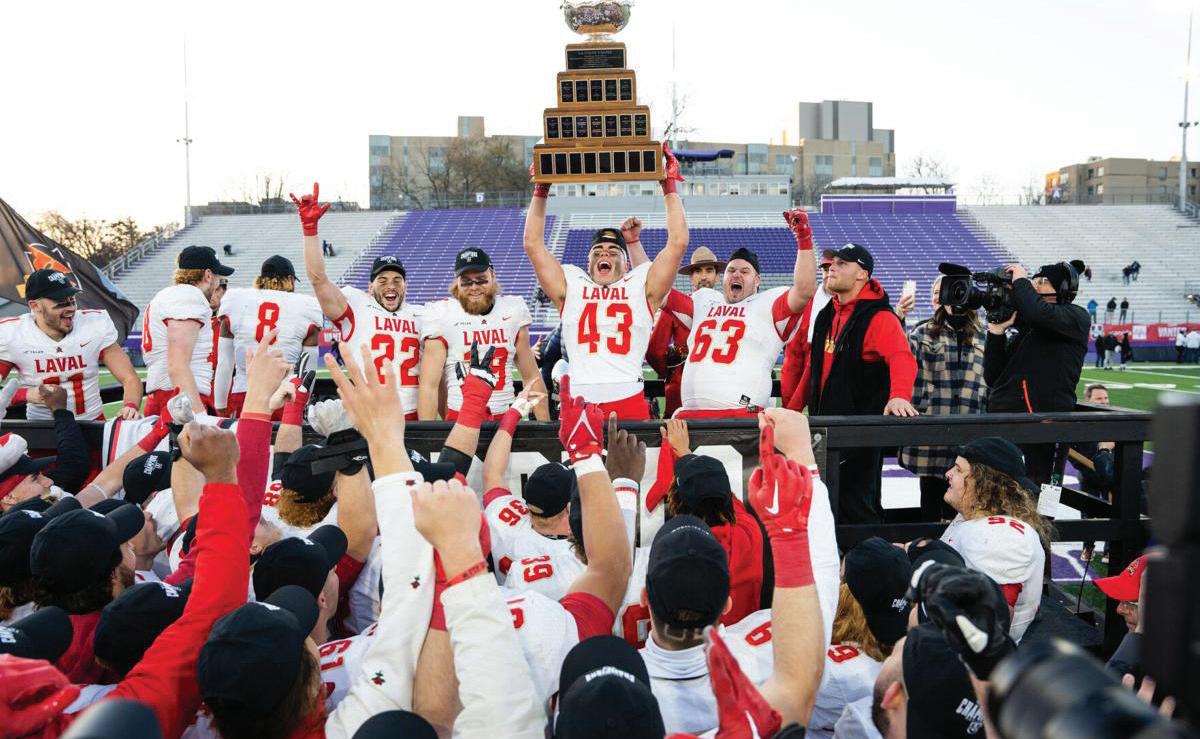
“It doesn’t get old, because it’s a different group. It's a di erent story, challenge and growth. This year, [we] were just young, stupid and fast,” joked Laval University Rouge et Or head coach Glen Constantin after winning his 10th national championship.
The University of Saskatchewan Huskies’ o ence couldn’t make it through the stout Laval defence in the dying minutes, as the Rouge et Or finally took the game away in the final 30 seconds after a
Saskatchewan three-and-out.
“We weathered the storm, and we believed in ourselves. Our players were coachable, they accepted constructive criticism all year and they learned valuable lessons. The growth and maturity of this team was exponential,” said Constantin.
Laval second-year receiver and Vanier Cup most valuable player Kevin Mital had a standout performance in front of 8,420 fans at Western Alumni Stadium, going for 142 yards o of eight receptions. Despite no receiving touchdowns, he did pick up the passing touchdown in the fourth quarter.
“For this week I’m just an athlete. I’ll be a student for next week,” said Mital.



In a tightly-contested game, it took

championship-level trickery for the Rouge et Or to come out on top.
On Laval’s first drive of the fourth quarter, quarterback Arnaud Desjardins led his team down within the Huskies’ five-yard line. The following play saw the center snap the ball to Mital instead of Desjardins, fooling the Huskies defenders. Mital completed a one-yard passing touchdown to second-year fullback David Dallaire to extend the Rouge et Or’s lead by 10.
Desjardins threw for 397 yards and completed 75 per cent of his passes, despite not throwing a single touchdown.
“[Desjardins] is a cool customer. He’s a young quarterback, only in his second year and the future is bright,” said Constantin.
Constantin took time during his press conference to thank Western University and Mustangs football head coach Greg Marshall for hosting the 57th Vanier Cup.
“[Marshall] is a great host. I know the feeling, to lose and to have to host,” said Constantin, referring to last year’s Mustangs Vanier Cup victory against Saskatchewan at Laval. “To do it in such a short time frame is a great challenge, and it was a great student-athlete experience.”
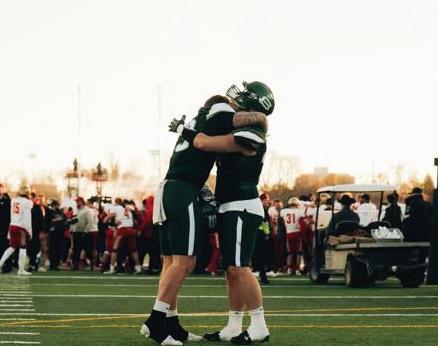
Saturday’s championship further cements the Rouge et Or as one of the greatest Canadian university football programs in history.
It’s hard to think any Quebec team will ever match the success of the kids in red and gold.
Western hosted gold medalist decathlete Damian Warner at Thompson Arena on Nov. 14 in part of his 2021 induction to Canada’s Walk of Fame.
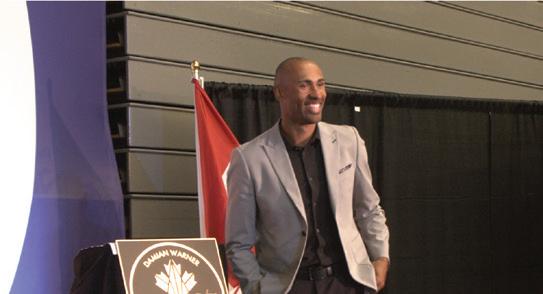

The ceremony featured the unveiling of Warner’s Walk of Fame plaque, a performance from Canadian musician Jordan Hart and speeches from London residents and event sponsors.

“When you look at the people that have been inducted in the past and the people that will be inducted in the future, you can’t help but think you don’t necessarily belong on that list. Nevertheless, I’m grateful,” said Warner.
Warner used Western University’s facilities as a training ground for the 2021 Olympic Games in Tokyo — which were delayed from 2020 due to the COVID-19 pandemic — where he became the only Canadian to win gold in the decathlon.

“This facility and Western has been really important for me,” Warner said. “To come here and see all these familiar faces and people that have impacted me during my career, it’s really special.”
Western recently completed a $2 million renovation of Thompson Arena and a $6 million renovation of Western Alumni Stadium. The university also set up a makeshift pole vault training centre for Warner and his team to use during his training for the 2020 games.
During the campus’ shutdown during the early phases of the pandemic in 2020, War-
ner moved to south London and began training at a makeshift ground in Farquharson Arena — Western donated equipment for Warner to use during this period.
“The impact that Damian and Team Warner has had as leaders is incredible for our campus. It is his home,” said Mustangs Athletics director of sports and recreation Christine Stapleton.
Mustangs’ track and field coach, Vickie Croley, was Warner’s lead coach for the Rio 2016 Olympic Games, where he won bronze in the decathlon. Croley was also his hurdles coach for the recent Tokyo Games.
The Hometown Stars initiative, started by Canada’s Walk of Fame, looked to welcome Canadian inductees at
a public celebration. Inductees were also awarded $10,000 for a donation to the charity of their choice. Warner chose local organizations, KidSport and the Boys and Girls Club of London to each receive $5,000.
Warner cites BGC London as the place he learned to play basketball, beginning his athletic career. It was there he built a relationship with his high-school coaches, Gar Leyshon and Dennis Nielsen, who eventually joined Team Warner in the journey that led to the Tokyo Olym-
Warner acknowledged his fellow 2021 Canadian inductees, in-

Bret Hart, the discoverer of insulin Frederick Banting and actor Keanu Reeves.
Outgoing City of London Mayor Ed Holder summed up London’s reception of Warner to wrap up the celebratory morning.
“Here in London, we celebrate Damian Warner’s heart of gold, even more than his gold medal.”
 DANIELLE PAUL CULTURE EDITOR SCOTT HO COPY EDITOR
DANIELLE PAUL CULTURE EDITOR SCOTT HO COPY EDITOR



There's nothing that gets me in the holiday spirit more than cuddling up on the couch with hot chocolate and watching a Christmas movie while it’s snowing outside. But this time, I traded my flat screen for the stage — and I’ll never go back.
Elf: The Musical, at London’s Grand Theatre, featured amazing singing, witty jokes, well-performed choreography and state-of-the-art sets.
An adaption of the 2003 film Elf starring Will Ferrell, the musical follows the story of Buddy the Elf, who comes to the realization that he’s a human. He then goes on a journey to find his father who has no Christmas spirit — spreading holiday spirit and happiness to everyone he meets.
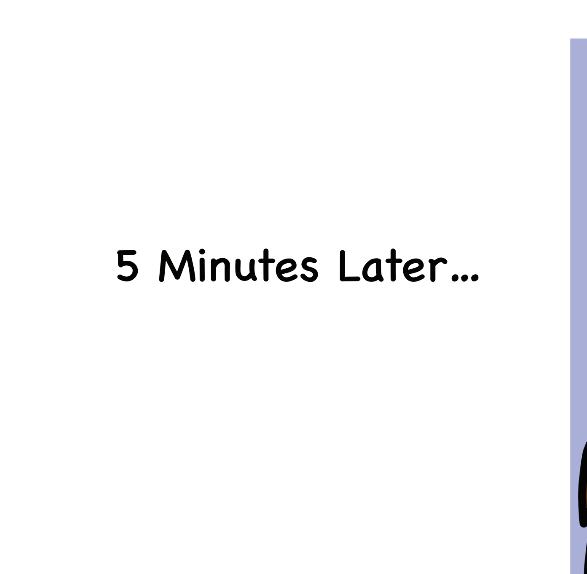
At first, I was nervous Buddy the Elf
— Izad Etemadi — would not live up to Ferrell’s portrayal of the character in the movie. But I don’t think a better Buddy could have been casted.
While Buddy can be a slightly irritating character due to his childish nature, Etemadi gave a stand-out performance with phenomenal vocals and a perfect annoying-yet-loveable portrayal.
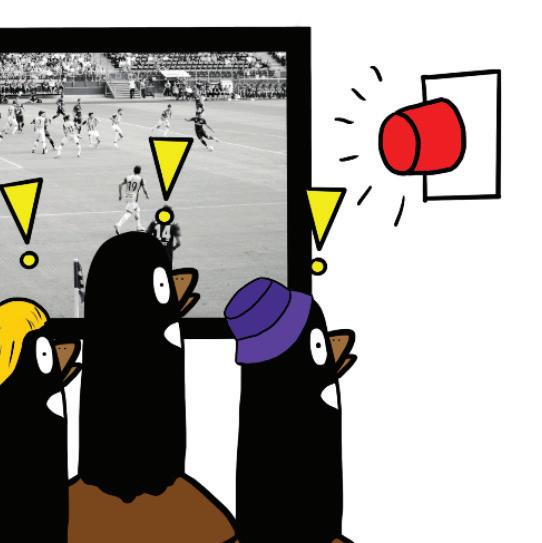
The sets featured light-up roofs, cutouts of New York City and even falling artificial snow — it was a set like nothing I’ve seen from the Grand before.
The cast was made up of children and adults who played elves and New Yorkers, with a live orchestra performing each of the songs. Aadin Church played the two opposite roles of Santa Claus and the Scrooge-like, workaholic boss of Buddy’s father. He played both roles
phenomenally.
While most of the acting and the songs were impressive, it was the tiny details that really brought the musical to life. Whether it be Buddy’s candy cane socks, or the added holiday scarf Buddy’s dad wore when he finally felt the Christmas spirit — these small parts that made the show just a bit more magical.
With 22,000 tickets sold since the musical’s debut, the Grand Theatre added five more performance days for Elf: The Musical — and I wish I could see it again for the first time.


Tickets are on sale now on the Grand’s website, and the show is running until Dec. 31.











